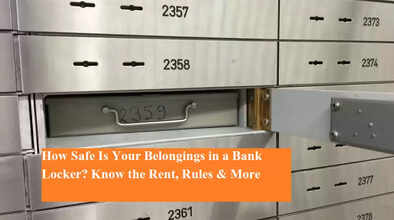How Safe Is Your Belongings in a Bank Locker? Know the Rent, Rules & More

A bank locker is a rented safe deposit box offered by banks where customers can securely store valuables like jewelry, documents, and other important items. While it is considered a safe option, there are many details—like rent, terms, insurance, and access rules—you should be aware of before opting for one. Here's everything you need to know:
🔐 What Is a Bank Locker?
A bank locker is a secure storage space rented out by a bank. Customers can use it to store precious items like gold, documents, or heirlooms that they don't want to keep at home.
💰 Locker Rent & Security Deposit
-
Annual rent varies based on:
-
Size of the locker
-
Location of the bank branch
-
-
In rural areas, small lockers may start from ₹1,000 per year.
-
In metro cities, large lockers can cost over ₹10,000 annually.
-
Most banks require a fixed deposit as a security guarantee.
🏦 Account Requirement
To get a locker, you must have a savings or current account with the bank. The locker is linked to your bank account.
🛡️ Are Locker Contents Insured?
-
No, locker contents are not automatically insured.
-
Banks are only responsible for the security of the locker premises, not what’s kept inside—unless there is proven negligence on the bank's part.
💡 Insurance Options
Some banks partner with third-party insurers to offer optional insurance for locker contents. If you're storing expensive items like gold or antiques, opting for insurance is a wise move.
🕒 Access Rules
-
Lockers can be accessed only during bank working hours.
-
Each visit is logged via bank journals or biometric records for security tracking.
👥 Joint Ownership & Nomination
-
Lockers can be jointly owned.
-
You can also nominate a beneficiary.
-
Both joint holders can access the locker as per their convenience.
⚰️ What Happens After the Locker Holder’s Death?
-
In case of the locker holder’s death, the contents are handed over to the nominee after submission of required documents.
📜 RBI's New Locker Rules (2021)
-
Banks must use a standard locker agreement format.
-
Locker holders must access the locker at least once every 5 years.
-
Inactivity beyond 5 years may lead the bank to initiate action, including opening the locker with prior notice.
⚠️ Bank’s Liability
-
The bank is liable only if the loss or damage is due to its negligence.
-
Otherwise, the responsibility for the contents lies with the customer.
🤔 Should You Get a Bank Locker?
-
If you have valuables that are unsafe to store at home, a bank locker is a good option.
-
However, do consider:
-
Annual rent
-
Limited access hours
-
Need for separate insurance
-
📄 Final Tip
Always read the locker agreement carefully before signing. Make sure it aligns with your specific storage and security needs.
💡 Note: This article is for informational purposes only. Always consult your bank and read the agreement terms thoroughly before opting for a locker.

